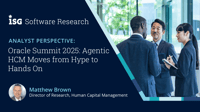Frontline work is being reshaped from every direction: tighter labor pools, unpredictable demand and a workforce that expects more than just a paycheck. Yet too many organizations are still treating workforce scheduling like a game of Tetris—moving blocks around and hoping they fit. It’s time to admit that smart scheduling isn’t just a nice-to-have—it’s a frontline imperative. And if the enterprise is still thinking of it as “just logistics,” it's already falling behind.
Read More
Topics:
Human Capital Management,
Employee Engagement,
Workforce Management,
Employees & HCM - Business & Technologies
The learning management system (LMS) market is evolving, with the lines that once rigidly defined categories becoming increasingly blurred. Today, an LMS that lacks Learning Experience Platform (LXP) capabilities risks becoming obsolete in an environment where user expectations are shifting rapidly. In a similar vein, an LMS and LXP that fail to harness the power of artificial intelligence (AI) to guide learners through their diverse learning journeys face a similar fate.
Read More
Topics:
Human Capital Management,
Employee Engagement,
Learning Management,
Employees & HCM - Business & Technologies
I recently attended the Oracle Apps & Industry Analyst Summit in Redwood City, California. Over the course of two days, Oracle offered a concentrated look at a market that is both racing ahead and tripping over its own shoelaces. Generative, predictive and now agentic artificial intelligence (AI) have become the new currency of competitive advantage across HCM; Oracle alone has delivered more than 150 AI capabilities across its Fusion Apps and 62 inside HCM in just two years, climbing from...
Read More
Topics:
Human Capital Management,
Employee Engagement,
Learning Management,
Talent Management,
Workforce Management,
Payroll Management,
Total Compensation Management,
Employees & HCM - Business & Technologies
Workforce planning has long been a cornerstone of business strategy, yet many enterprises still approach it with outdated methods. Traditionally, it has been rigid, reactive, subjective and often siloed. But as industries evolve—especially those with high turnover and a large frontline workforce, like retail, healthcare and hospitality—companies must rethink how they forecast talent needs. Technology is reshaping workforce planning, making it more dynamic, precise and forward-thinking.
Read More
Topics:
HCM,
Human Capital Management,
Employee Engagement,
Learning Management,
Talent Management,
Workforce Management,
Total Compensation Management
Attending isolved’s first Analyst Summit was more than just an opportunity to hear about their latest innovations—it was a front-row seat to their vision for the future of HR technology and services. A central theme emerged quickly—they are deeply committed to supporting small and mid-sized businesses (SMBs), not just with technology but also with robust services and an ecosystem of partners that elevate HR teams into the strategic powerhouses they were always meant to be.
Read More
Topics:
Human Capital Management,
Employee Engagement,
Learning Management,
Talent Management,
Workforce Management,
Payroll Management,
Total Compensation Management
The HCM market has undergone a significant transformation in recent years. Legacy providers, long the dominant force, built their platforms primarily for administrative efficiency—streamlining HR processes but often overlooking the broader employee experience. However, today’s workforce expects more. Employees and managers now demand intuitive, engaging and connected HR experiences that extend beyond transactional tasks.
Read More
Topics:
Human Capital Management,
Employee Engagement,
Learning Management,
Talent Management
















